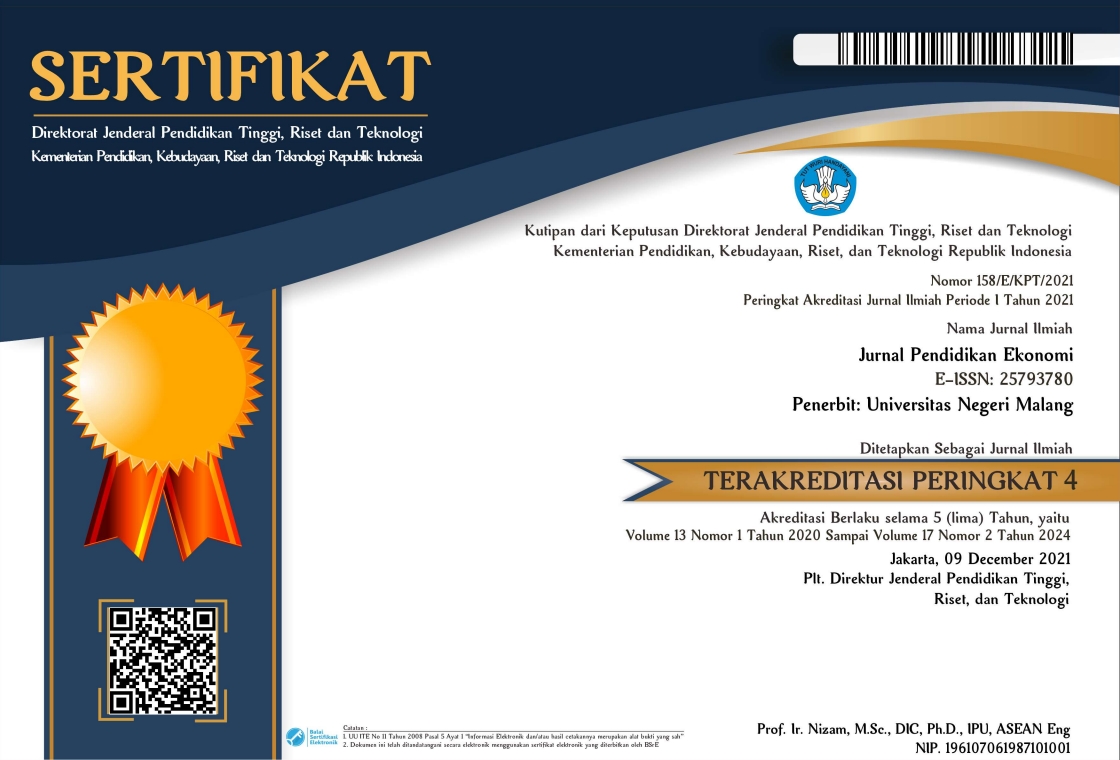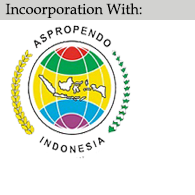Faktor yang Mempengaruhi Soft Skill Siswa SMK Negeri 2 Blitar Dalam Menghadapi Dunia Kerja di Era Revolusi Industri 4.0
Abstract
This study aims to provide empirical evidence on what factors impact the development of soft skills in vocational school students who will become future national economic mobilizers. The focus of this research was to determine whether there is a distinction between the soft skills profile of vocational school graduates and the requirements of the workplace in the world. The variables consist of learning processes (X1), industrial training (X2), and student’s soft skills (Y).This research uses a quantitative approach. The population of this study is 130 students of XII SMK Negeri 2 Blitar from Accounting and Financial Institution expertise program. Sampling is done by proportional random sampling technique. Data collection is done by using questionnaires. Technical data analysis uses multiple linear analysis with the help of SPSS software. The results showed that: the learning process has a significant effect on students' soft skills, showing a significance value of 0.00 below ρ value of 0.05; and field practice had no significant effect on the student's soft skills, indicating a significance value of 0.357 above ρ value of 0.05.
DOI: https://dx.doi.org/10.17977/UM014v21i22021p129
Keywords
Full Text:
PDFReferences
Arifin, M. (2014). Analisa dan Perancangan Sistem Informasi Praktek Kerja Lapangan Pada Instansi/Perusahaan. Simetris : Jurnal Teknik Mesin, Elektro Dan Ilmu Komputer, 5(1), 49. https://doi.org/10.24176/simet.v5i1.130
Badan Pusat Statistik. 2020. Tingkat Pengangguran Terbuka Berdasarkan Tingkat Pendidikan di Jawa Timur. (Online), (https://malangkota.bps. go.id, diakses tanggal 10 Oktober 2020)
B.Randang, Frankiano. (2011). Kesiapan tenaga kerja indonesia dalam menghadapi persaingan dengan tenaga kerja asing. 5(1), 66–73
Brown, B. (2015). Twenty First Century Skills: A Bermuda College. Twenty First Century Skil, 58-64
Budiaji, W. (2018). Skala Pengukuran dan Jumlah Respon Skala Likert. July. https://doi.org/10.31227/osf.io/k7bgy
Dikmenjur. 2012. Pedoman Pelaksanaan Prakerin. Jakarta: Dikmenjur
Faryadi, Q. (2012). Effective Teaching and Effective Learning : Instructional Design Perspective. International Journal of Engineering Research and Applications, 2(1), 222–228
Ennis, R. H. (2011). The Nature of Critical Thinking: An Outline of Critical Thinking Dispositions and Abilities. Presentation at the Sixth International Conference on Thinking at MIT, Cambridge, MA, July, 1994. Last Revised May, 2011. II, 6(2), 1–8. https://doi.org/10.22329/il.v6i2.2729
Hall, A. (2007). Vygotsky Goes Online: Learning Design from a Socio-cultural Perspective. Learning and Socio-cultural Theory: Exploring Modern Vygotskian Perspectives International Workshop, 1(1), 95-96
Hidayati, U., Mardinawati, Susena, Ardiansah, M. N., & Akuntansi. (2015). Faktor-Faktor Yang Mempengaruhi Pengembangan Soft Skill Mahasiswa Politeknik Semarang. Dipresentasikan pada Prosiding Sentrinov, 01(1), 610–621
Khurniawan, A. (2019). Profil Lulusan SMK Terhadap Tingkat Penyerapan Tenaga Kerja di Indonesia Tahun 2018-2019. December
Leen, C. C., Hong, H., Kwan, F. N. H., & Ying, T. W. (2014). Creative and Critical Thinking in Singapore Schools. In An Institure of Nanyang Technological University ,Vol. 2, Issue 2
Maelah, R., Aman, A., Mohamed, Z. M., & Ramli, R. (2012). Enhancing Soft Skills Of Accounting Undergraduates Through Industrial Training. Procedia - Social and Behavioral Sciences 59, 541–549. https://doi.org/10.1016/j.sbspro.2012.09.312
Mariah, S. & Sugandi, M. 2010. Kesenjangan Soft Skill Lulusan SMK dengan Kebutuhan Tenaga Kerja di Industri. Jurnal Inovasi dan Perekayasa Pendidikan, 3(1): 379--400.
Mufanti, R. (2015). Penumbuhan Soft Skill Siswa Dalam Proses Pembelajaran. Prosiding Seminar Nasional Pendidikan “Inovasi Pembelajaran Untuk Pendidikan Berkemajuan,” November, 204–210.
Mustika, R. C., Nurjanah, N., & Chisbiyah, L. A. (2017). Pengaruh Praktik Kerja Lapangan Terhadap Soft Skill Siswa Smk Bidang Keahlian Jasa Boga Di Kota Malang. Jurnal Teknologi dan Kejuruan, 40(2), 147–156.
Ngadi. (2014). The Relevance of Vocational Education on Labor Market in Salatiga. Jurnal Kependudukan Indonesia, 9(1), 59–70.
Orlando P., P. (2013). Soft Skills: From University To The Work Environment. Analysis Of A Survey Of Graduates In Portugal. Regional and Sectoral Economic Studies, 13(1), 105-118.
Pane, A., & Dasopang, M. D. (2017). Belajar dan Pembelajaran. Fitrah: Jurnal Kajian Ilmu-Ilmu Keislaman Vol., 03(2), 333–352. https://doi.org/https://doi.org/10.24952/fitrah.v3i2.945
Paolini, A. C. (2015). School Counselor’s Role in Facilitating the Development of Students’ Soft Skills: Intrapersonal and Interpersonal Attributes to Promote Career Readiness. Global Journal of Human-Social Science, 15(10), 1-10.
Partono, P., Wardhani, H. N., Setyowati, N. I., Tsalitsa, A., & Putri, S. N. (2021). Strategi Meningkatkan Kompetensi 4C (Critical Thinking, Creativity, Communication, & Collaborative). Jurnal Penelitian Ilmu Pendidikan, 14(1), 41–52. https://doi.org/10.21831/jpipfip.v14i1.35810
Piawa, C. Y. (2010). Building a test to assess creative and critical thinking simultaneously. Procedia - Social and Behavioral Sciences, 2(2), 551–559. https://doi.org/10.1016/j.sbspro.2010.03.062
Septikasari, R., & Frasandy, R. N. (2018). Keterampilan 4C Abad 21 Dalam Pembelajaran Pendidikan Dasar. Jurnal Tarbiyah Al-Awlad, VIII(2), 107–117.
Setiani, F., & Rasto. (2016). Mengembangkan soft skill siswa melalui proses pembelajaran ( Developing students ’ soft skill through teaching and learning process ). Jurnal Pendidikan Manajemen Perkantoran, 1(1), 160–166. http://ejournal.upi.edu/index.php/jpmanper/article/view/00000
Subramaniam, I. (2013). Teachers perception on their readiness in integrating soft skills in the teaching and learning. OSR Journal of Research & Method in Education, 2(5), 19-29.
Sunhaji, S. (2014). Konsep Manajemen Kelas Dan Implikasinya Dalam Pembelajaran. Jurnal Kependidikan, 2(2), 30–46. https://doi.org/10.24090/jk.v2i2.551
Sutrisno, B. (2016). Profil Model Pembelajaran Soft-Skill Pada SMK Bidang Ekonomi Di Surakarta ( Kajian Aspek Apa; Mengapa; Dan Bagaimana ). Jurnal Pendidikan Ilmu Sosial, 26(2), 115–135. https://journals.ums.ac.id/index.php/jpis/article/view/3354
Ramlall, S. (2014). The Value of Soft-Skills in the Accounting Profession: Perspectives of Current Accounting Students. Advances in Research, 2(11), 645–654. https://doi.org/10.9734/ijpss/2014/11000
Vaidya, S., Ambad, P., & Bhosle, S. (2018). Industry 4.0 - A Glimpse. Procedia Manufacturing, 20, 233–238. https://doi.org/10.1016/j.promfg.2018.02.034
Valid, Y. M., & Taman, A. (2012). Pengaruh Pengalaman Praktik Industri dan Prestasi Belajar Terhadap Kesiapan Kerja Siswa Kelas XI Program Keahlian Akuntansi SMK YPKK 2 Sleman Yogyakarta. Kajian Pendidikan Akuntansi Indonesia, 208–225.
Winterton, J., & Turner, J. J. (2019). Preparing graduates for work readiness: an overview and agenda. Education and Training, 61(5), 536–551. https://doi.org/10.1108/ET-03-2019-0044
Zubaidah, S. (2018). Mengenal 4C: Learning and Innovation Skills Untuk Menghadapi Era Revolusi Industri 4.0. Dipresentasikan di 2nd Science Education National Conference Pada Bulan Oktober 2018.
Refbacks
- There are currently no refbacks.

Jurnal Penddidikan Ekonomi is licensed under a Creative Commons Attribution-NonCommercial-ShareAlike 4.0 International License





